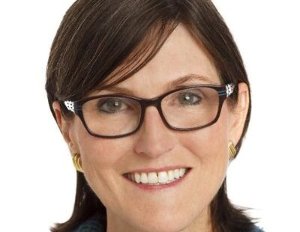Cathie Wood: some answers for jittery Ark investors
New Zealand investors in Cathie Wood’s high-risk Ark Innovation exchange-traded fund have been told that despite the fund tanking last year and losing more than half its value, it is still on target to deliver the expected returns.
Friday, March 11th 2022, 6:00AM  4 Comments
4 Comments
by Jenni McManus

To be considered for the Disruptive Innovation Fund, stocks must have the potential to double in value every five years. But given the losses of the past year, one investor noted that returns would now need to quadruple in the next four years to meet that target. Did Wood think that was still possible?
“We do believe that, and in fact our return expectations are north of that,” Wood told investors on a recent webinar, hosted by Nikko Asset Management, through which Kiwi retail investors can access the Florida-based Ark via a PIE fund.
At its peak, units in the Disruptive Innovation Fund were trading at US$159.70. Today the price is US$60.23.
Wood says the haemorrhaging of investors and funds which began in February 2021 was sparked by “inflation and interest rate fears” – fears she believes were “misplaced”. In fact, the war in Ukraine and a boost in food and energy prices had dramatically heighted the risk of recession. Inflation would come in on the low side of expectations, she said.
According to Wood, Ark still has US$40 billion worth of under management. Inflows over the past year totalled US$17b but were heavily front-end (commission) weighted, she says. “If we look at gross flows last year, they were in the US$21b range. We kept US$17b of that. This year to date there were a few days of big outflows, but I believe we’re now bordering on flat-to-inflowing.”
George Carter, Nikko AM’s New Zealand managing director, describes the webinar as “very timely”. He acknowledges that investors who expected the fund to continue doubling in value every year, as happened between 2020 and February 2021, have probably been spooked “but that’s not generally been our experience of investors”. Others have “decided to slightly down-weight” the percentage of Ark in their portfolios.
“It highlights the real importance of when you invest in something, you’ve got to believe in the underlying strategy and philosophy of what it’s doing,” Carter says.
“Generally speaking, investors who bought into the fund bought into it because they believe and agree with and support the philosophy that next-generation innovation will the financial success story of the future.”
Undoubtedly, Ark’s Disruptive Innovation Fund is volatile. By law, fund managers must disclose volatility and on a range of one to seven, where most equity funds register as five, Ark is a seven. “It has always been disclosed and talked about as being right at the volatile end of investment,” Carter says, meaning investors need to be able to cope with big drops in price as well as the upside.
Ark is too volatile for Nikko AM’s conservative fund. It has a 3% weighting in Nikko’s balanced fund and 6% in its growth fund.
Carter says he personally likes Wood’s approach. “She’s articulate and thoughtful and obviously has strong conviction in her philosophy. There’s not the arrogance that says, ‘I can never be wrong.’ I think that’s really important – as Rudyard Kipling put it, ‘to make allowance’.
| « Low-fee Simplicity runs foul of FMA with misleading ad campaign | Tough times ahead for NZ economy: Nikko economist » |
Special Offers
Comments from our readers
Firms which lead those technologies will rise in value sharply, whereas at least half of current legacy firms will end up bankrupt. So holding a broad index may, over the next decade, be higher risk that history suggests, whereas holding a small number of tech firms may provide uniquely high returns.
Therefore you only invest in ARK if
(i) you believe that story,
(ii) you believe that ARK has correctly identified future winners,
(iii) those firms are underpriced given the extreme future profits,
(iv) you have at least a 6 year time horizon,
(v) you don't mind high volatility, and several years of sharp downturns,
(vi) you understand what an Active ETF is.
So a long list of conditions. Unsuitable to a lot of investors but worth a gamble for more informed investors.
Risky for any adviser to recommend unless you can ensure that the client understands the Technological Transformation story and the high risk.
Sign In to add your comment
| Printable version | Email to a friend |




1. What are the expected returns that Ark believes they will achieve, & over what time frame?
2. Where did Ark purchase their crystal ball from?